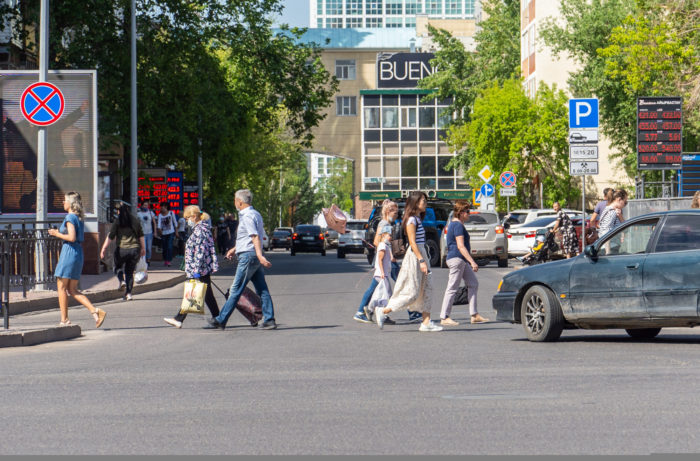With the gradual ease up of movement restrictions, people are beginning to venture back into the empty roads, streets, and parks in certain parts of Kazakhstan. Customers have begun to queue up in front of small stores that are working at limited capacity. The government has been clear with its conditions and stipulations, the easing will be temporary depending on whether it results in a spike of COVID-19 cases or not.

People crossing a street on the Rebulic Avenue, the busiest avenue in Nur-Sultan. Photo credit Nur-Sultan Akimat.
Kazakhstan’s Temir Zholy (KTZ) – the national railway carrier resumed train ticket sales May 15th. The internal railroad system will gradually resume its service starting June 1.
Kazakhstan’s railway stations are ready to open, but only if they comply with strict sanitary requirements. These safety measures are quite strict and will include mandatory non-contact thermometry reading of all passengers and staff by guards. Furthermore, entrance will only be given to passengers with face masks and a one-meter minimum distance between people will be enforced. Stations will ensure the latter with floor demarcations, painted movement arrows, and clearly visible signs and posters that explain the new rules.
To minimize person to person contact, KTZ encourages people to get into the habit of buying tickets online on the official website or by using the KTZ mobile app, and self-service terminals within the station.
The chief sanitary officer of the Almaty Region, decreed that the roads between districts and cities within the region would be opened, but not for villages that were officially determined to be COVID-19 contaminated. These areas will remain cordoned off, with transportation to and from them still shut down.
Kazakhstan removed many lockdown restrictions throughout the country May 18. The country allowed for hotels, catering facilities with a capacity of up to 30 seats, and catering facilities operating in open air terraces to resume their operations. Religious worship was resumed, as long as 70 percent of the total usable area remained unfilled and social distancing observed.
Kazakh capital’s Central Market, the city’s largest market, reopened May 18.
“Today, together with the SES (Sanitary and epidemiological station) bodies, we determined the readiness of Central Market to resume operating in the framework of quarantine mitigation. All markets have been provided with antiseptics, masks, and new logistical requirements. The market’s will have to monitor compliance with the new sanitary standards, if they wish to stay open,” said Yerlan Bekmurzayev, the head of the Nur-Sultan Investment and Enterprise Development Department.
Although it was a big day for the largest market in the capital, the city akimat concurrently closed down a number of companies, shops and cafes that were found in violation of the new sanitary standards. The akimat representatives, police, and epidemiologists have been conducting surprise raids on facilities suspected of non-compliance with these requirements. 15 facilities have already been closed for their non-compliance.
The Nur-Sultan Akimat (city administration) reserves the right to suspend public transport if they find that the public begins violating the requirements to wear masks while commuting.
“If sanitary standards are not upheld, public transport will be shut down,” City Transportation Systems Press Secretary Oksana Loskutova wrote on her Facebook page.
Before the state of emergency, busses could transport more than 750,000 people. The passenger number decreased to approximately 30-35 percent of the normal total, which is still 225,000-262,500 people.
Almaty and Nur-Sultan plan to reopen large shopping and entertainment centers May 25. This, however, can also be postponed, if COVID-19 spread rates exceed five percent.
“We need an updated efficient and compact state COVID monitoring system that can quickly make decisions in response to a changing, dynamic situation. It is necessary to start thinking about implementing the concept of an e-government which can give consultations, certificates and handle applications electronically. Communication between businesses and the state will now switch to a digital format and eventually become contactless. For this, the digitization of the public services system will be implemented. This is an opportunity to digitize the economy and Kazakh society, ” Kazakh President Kasym-Zhomart Tokayev said.
